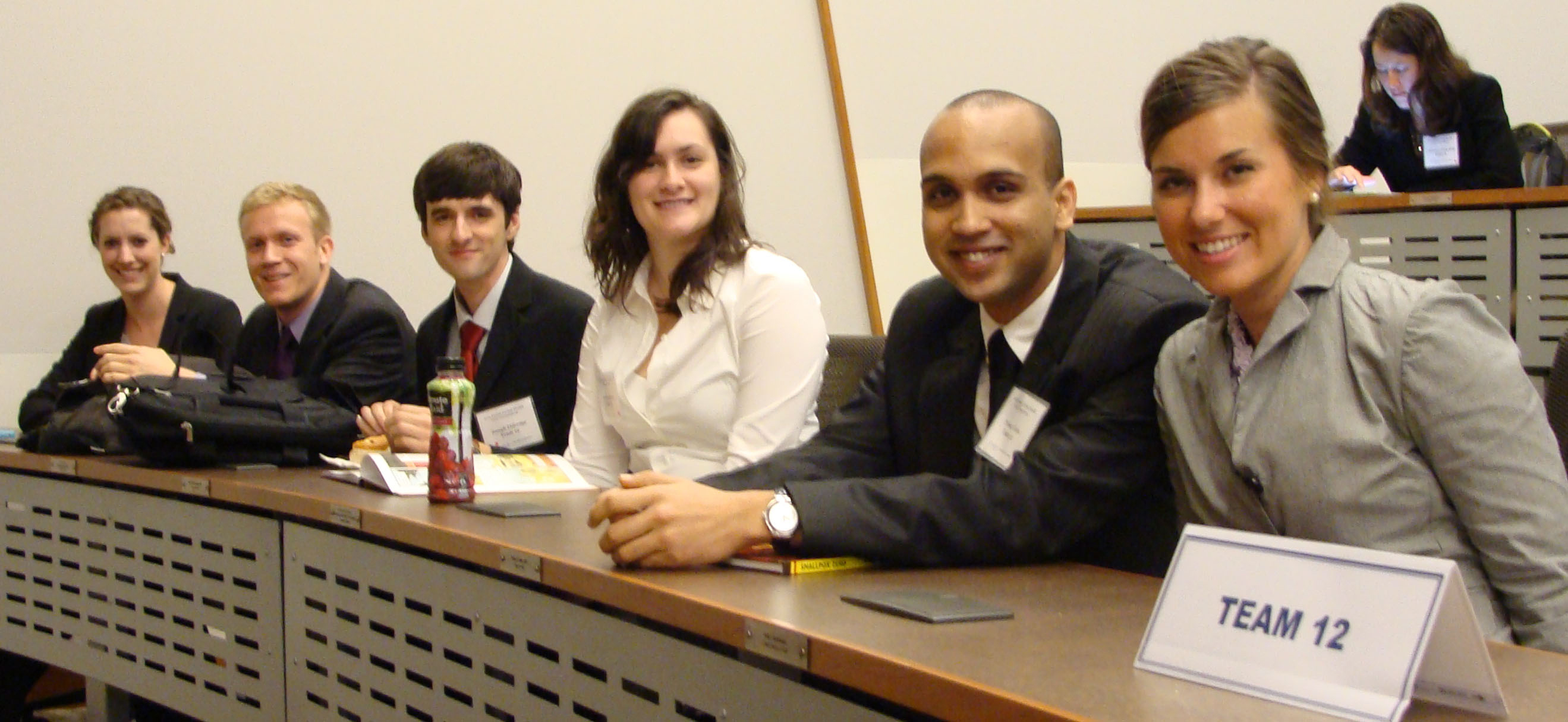April 6, 2012 — An interdisciplinary group of University of Virginia students honed collaboration skills to develop an innovative solution to a 21st-century health issue in Global Health Case Study Competition, held recently in Atlanta.
Emory University hosted the event, which was held March 30 and 31. This is the fifth year of the international competition and the first year U.Va. students participated. Teams competed for a $6,000 grand prize.
The U.Va. team included Nursing School student Terra Bailey; Pranay Sunha in the School of Medicine; Engineering School student Joseph Eldredge; Chris Rannefors in the McIntire School of Commerce; Amanda Below, an anthropology major and global public policy minor the College of Arts & Sciences who has been admitted into U.Va.'s fifth-year masters in public health program in the Medical School; and Caitlin Carr of the Frank Batten School of Leadership and Public Policy.
Several days before their departure for Atlanta, the students – along with 22 teams from competing universities across the U.S. and around the world – received the details of their global health assignment: Help a fictional non-governmental organization, dubbed CANAID, develop an $18 million budget to address health issues in Sri Lanka. Each team was provided with background information about the country on the Monday before the competition.
"The materials provided were an accurate representation of the situation there, but the organization was fictitious," said Nursing School professor and director of international initiatives Marianne Baernholdt, who, together with Rebecca Dillingham, a professor of medicine and associate director of U.Va.'s Center for Global Health, acted as the team's faculty mentors.
The teams were tasked with creating a cross-disciplinary solution to present to competition judges, who included representatives from the Centers for Disease Control and Prevention, among other federal agencies. Winners were determined based on the soundness and robustness of their solutions.
The U.Va. team started meeting about six weeks before their assignment arrived to identify their strengths and gather relevant research materials.
"We started out practicing with cases from previous competitions," Below said. "At our first meeting it was clear we each had a topic area we were more proficient in. From there, each time we met, we brought our specific concerns and ideas to the group meeting and melded all those ideas together as we approached the case."
Bailey's experience with international aid and medical needs, gleaned from her involvement helping start an organization in Kenya and a new international nursing site in Ethiopia this summer, added a firsthand perspective to the project.
Eldredge, who worked with the Center for Global Health's Water and Health in Limpopo initiative as part of his systems engineering capstone project, worked on water infrastructure issues and questions related to clearing mines.
"In the Engineering School we are encouraged to think about technological products as 'actors' in society," he said. He knew whatever propositions they put forward could not conflict with efforts by the Sri Lankan government to build and rebuild water supply and sanitation infrastructure.
Carr applied her knowledge of public policy to issues related to funding and budget. Rannefors pulled together all the research and add his presentation skills to assure the PowerPoint presentation was polished. Below lent her expertise in anthropology and public policy to ensure the project was culturally sensitive.
"I was definitely a little rain cloud," Below said. "I was always pushing for our team to reconsider and reflect on the ethical, physical, emotional, cultural and other impacts of our ideas for the case and the population we proposed to partner with, hypothetically."
Once in Atlanta, the competition was tough. Teams presented their projects to the judges, who did not know what school the presenters were from, in a tournament format, with the winning teams competing in the second and final round.
U.Va.'s team presented their project in a group along with Oxford University, the University of Pennsylvania, Emory University and Tulane University. From that group, the Emory team advanced and ultimately won the competition. But the judges were impressed with U.Va's presentation.
"The judges came up to us one by one with incredibly flattering feedback," Sinha said. "Considering the quality of our proposals and the reactions of our judges, I am delighted to report that I think U.Va.'s programs really do train us very well to assess problems, collaborate with other intellectuals and professionals, and synthesize cogent and reasonable solutions for our world."
Bailey said opportunities for interdisciplinary problem-solving are an important part of the educational experience. "I learned more through this experience because of what my colleagues had to teach me, and therefore feel more adequately prepared to approach global health situations with well-rounded thoughts," she said.
Below said, "I don't think any issue, global health or otherwise, should be approached from one discipline or mindset. Every issue facing society – health, economic, environmental, legal, any you can think of really – would benefit from a multi-dimensional approach. No one person can see all the perspectives and no one discipline has all the answers."
Baernholdt said in response to students' positive feedback, she and Dillingham plan to develop an interdisciplinary course using global case studies.
The U.Va. team was co-sponsored by the Center for Global Health and the School of Nursing.
– by Jane Ford and Christine Kueter
Media Contact
Article Information
April 6, 2012
/content/uva-students-collaborate-tackle-global-health-issue-international-case-study-competition

